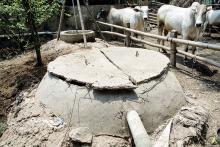Land Library
Bienvenue dans la bibliothèque du Land Portal. Explorez notre vaste collection de ressources en libre accès (plus de 74 000), comprenant des rapports, des articles scientifiques, des articles de recherche, des publications évaluées par des pairs, des documents juridiques, des vidéos et bien plus encore.
/ library resources
Showing items 109 through 117 of 371.Last year Angola earned 48 billion US dollars from petroleum. Yet the country that was once Africa’s largest agricultural producer is reduced to importing food. Now the government and private investors want to develop the agricultural sector, in the hope that Angola could become a new Brazil.
Sophal Uon, Chairperson of AFA, talks about what the MTCP2 means for farmers and farmer organizations in Southeast Asia (22 November 2013, Bangkok, Thailand)
Video teaser shown during the official launch of MTCP2 on November 23, 2013 in Bangkok, Thailand
The agri food system across the globe is fast restructuring.
We are continuously transforming a resource that is both essential and finite: our soils. We do so in a way that has serious social, economic and ecologic implications. There is an urgent need to shift these transformations to more sustainable pathways.
ELD is a joint initiative of Germany, the European Commission and the United Nations Convention to Combat Desertification (UNCCD). ELD offers a strong platform for raising public awareness of land degradation and advocating sustainable land-use strategies.
Soils around the world are degrading rapidly, reducing ecosystem diversity and some important functions, threatening food and other human securities, and increasing vulnerability to climate change. This is a vicious cycle created by and leading to further unsustainable land-use practices.
Conservation agriculture (CA) is an important form of sustainable land management, provided that the three basic principles - no tillage, permanent soil cover, diverse crop rotation or intercropping - are always observed.
Protecting land is vital to achieving food security and reducing poverty. This is the insight on which the global WOCAT network was built two decades ago.





